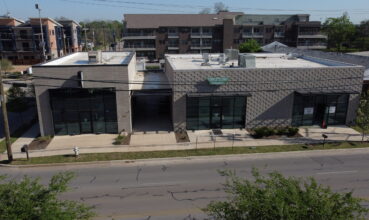“Tech is new for the sake of new. Real Estate is old for the sake of old,” observes Marc Zuluaga, co-founder and Chief Revenue Officer of Cadence OneFive. This tension between in...
Green Building Pioneer Sets Sights on Commercial Real Estate's Carbon Problem




After nearly three decades at the forefront of sustainable construction, Robert Politzer has witnessed a sea change in attitudes toward green buildings. The founder and CEO of GreenStreet Global, who became LEED accredited in 2002 and has overseen six LEED-certified projects, now sees his long-held vision becoming industry reality: environmental sustainability as a driver of property value.
“For a long time, I used to say substitute the word ‘smart’ for ‘green,’ because green in real estate had a negative connotation,” Politzer explains. “It always meant it’s going to cost more money.” But that perception has fundamentally shifted, particularly in recent years. “Now green buildings are valued higher than tired brown buildings that emit excess carbon emissions and are inefficient.”
This transformation in market attitudes comes at a crucial moment. Commercial buildings account for approximately 40% of global carbon emissions, a challenge that Politzer’s latest venture, GreenStreet Global, aims to address through an innovative three-phase approach that makes decarbonization financially attractive to property owners.
The company’s program begins with implementing cost-saving solutions on a shared-savings model, requiring zero upfront investment from clients. With 26 different solutions primarily focused on utility and operational efficiencies, this initial phase creates immediate value. One program can even generate millions in additional revenue for hospitals.
Phase two involves comprehensive building upgrades, from improving insulation and windows to replacing HVAC systems and electrical appliances. GreenStreet Global arranges 100% financing for both soft and hard costs, structuring the improvements so that energy savings exceed financing costs. The final phase introduces clean power technologies such as wind, solar, or cogeneration, further reducing costs and adding value to the property.
The company targets properties where owners have operating businesses and full responsibility for utility costs. “Hotels and hospitals in particular” are attractive targets, Politzer notes, along with assisted living facilities and industrial properties. Already, the company has projects underway in New York City, a Hilton hotel in Pensacola Beach, Florida, a charter school in Connecticut, and potential deals with seven California hospitals.
Politzer sees the push for building decarbonization accelerating due to both regulatory pressure and market forces. New York City’s Local Law 97, which he describes as “the first and most impactful climate-related building legislation in the world,” is beginning to show its teeth. Similar mandates are emerging in Boston, Los Angeles, San Francisco, and Chicago, while Maryland has set an aggressive target requiring buildings to be carbon neutral by 2040.
“The era of commercial building owners using the atmosphere as a free sewer for their carbon emissions is coming to an end,” Politzer declares. This shift isn’t just driven by legislation – banks, insurance companies, and other financial institutions are increasingly likely to devalue high-emission buildings. Additionally, corporate tenants and their employees are demanding healthier, greener workspaces.
With industrial facilities leading in emissions, followed by hospitals and hotels, GreenStreet Global’s focus on high-energy-usage properties positions it to make a significant impact. The urgency of this work isn’t lost on Politzer, who sees the next eight to ten years as critical for human civilization to make dramatic shifts in how we power our buildings and businesses.
“Different from every other environmental crisis in human civilization history, this one is inherently global,” Politzer emphasizes. “There’s no escape from it.” He hopes the current “jog towards decarbonization becomes a sprint” – a race that, after 25 years in sustainable building, he’s well-positioned to help lead.
As extreme weather events increase in frequency and severity, Politzer believes the momentum behind building decarbonization will only grow stronger. Through GreenStreet Global’s innovative financing approach, he’s working to ensure that environmental responsibility and profitability go hand in hand, making green buildings not just the ethical choice, but the smart business decision.
Similar Articles
Explore similar articles from Our Team of Experts.


From his vantage point in Boston’s commercial real estate market, Casey Valente is witnessing a remarkable transformation. As foreign capital flows in and creative deal structures emer...


“We have an optimistic view of the future,” says Rob Huthnance, newly appointed President of CT Realty, a company at the forefront of industrial real estate development across th...


When the 2008 financial crisis left Skyler Hartman fired from a job at Kimberly Clark, where he worked as an industrial electrician, it sparked an entrepreneurial awakening. “Ever sinc...


Bridging Design and Development: Sean Pichon Brings Developer-Focused Architecture to Michael Graves
When architects understand the developer’s mindset, exceptional projects emerge. This philosophy has guided Sean Pichon throughout his career, from his early days with prominent firms ...




